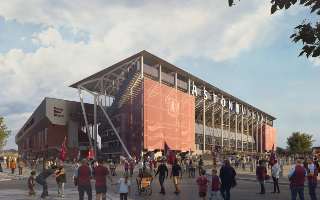Euro 2028 Stadiums: United Kingdom and Ireland
| Tournament name | City | Country | Tournament capacity |
|---|---|---|---|
 Wembley Stadium Wembley Stadium |
London |
 |
90 000 |
 Millennium Stadium Millennium Stadium |
Cardiff |
 |
73 931 |
 Tottenham Hotspur Stadium Tottenham Hotspur Stadium |
London |
 |
62 850 |
 City of Manchester Stadium City of Manchester Stadium |
Manchester |
 |
62 170 |
 St. James’ Park St. James’ Park |
Newcastle upon Tyne |
 |
52 305 |
 Hampden Park Hampden Park |
Glasgow |
 |
51 866 |
 Aviva Stadium Aviva Stadium |
Dublin |
 |
51 700 |
 Villa Park Villa Park |
Birmingham |
 |
50 000 |
 Casement Park Casement Park |
Belfast |
 |
34 578 |
Description
UEFA Euro 2028 – stadiums, host cities and format of games
UEFA Euro 2028 will take place in the UK and Ireland after a joint bid from England, Northern Ireland, Ireland, Scotland and Wales was selected by the UEFA Executive Committee. This will be the fifth time the EURO has been played in multiple countries – following tournaments in Belgium and the Netherlands (2000), Austria and Switzerland (2008), Poland and Ukraine (2012) and Euro 2020, which took place in 11 different countries in the summer of 2021. What can we expect this time? Which stadiums will host the tournament and in which cities are they located? Read our comprehensive Euro 2028 guide.
How was the Euro 2028 host chosen?
Interested countries had until March 2022 to declare a bid to host with 10 stadiums, of which one must have 60,000 seats, one (preferably two) must have 50,000 seats, four must have 40,000 seats and three must have 30,000 seats. The final selection of the host of Euro 2028 took place on October 10, 2023 in Nyon. The UEFA Executive Committee awarded the organisation to the only candidate – the joint bid of Great Britain and Ireland.
Who were Great Britain and Ireland competing against to host Euro 2028?
On March 23, 2022, the Turkish Football Federation confirmed its application to host the 2028 European Championships. This is the sixth time Turkey has applied to host the championship (2008, 2012, 2016, 2020, 2024). On April 12, 2023, the TFF revealed the list of 10 stadiums applying for 2028 and 2032. Eventually, Turkey withdrew its application to host Euro 2028 in favour of a tournament scheduled for 2032. The Turks will then host the Euro together with Italy.
Which European Championship will it be?
Euro 2028 will be the 18th edition of the European Football Championship. The first final tournament was held in 1960 and since then the competition has been played regularly every four years (the exception was Euro 2020, which was postponed by one year due to the COVID-19 pandemic). In the first five editions, only four teams participated in the final tournament.
What do the Euro 2028 stadiums look like?
Football fans around the world are curious to know which stadiums will host UEFA Euro 2028 and what they have to offer. If you're one of them, you'll be able to find out more about the venues for this tournament right now!
We have gone into this topic in detail in the video, which you can watch below or directly on our YouTube channel. Ready for a virtual tour of the UEFA Euro 2028 stadiums? You'll be able to catch a glimpse of some of the world's most recognisable venues, new arenas and the aura that surrounds the European Championship stadiums!
Which stadium will host the Euro 2028 final?
There are many indications that, as was the case for the closing match of Euro 2020, the Euro 2028 final will be held at Wembley. It is the largest stadium in the UK and a living legend of English football. The first official match at the new Wembley was played on March 24, 2007 – a meeting between England and Italy's youth teams. On May 11 of the same year, a statue of Bobby Moore was unveiled just outside the main entrance. The London venue has for years been the second largest stadium in Europe, just behind Camp Nou. Its most striking feature is the towering 133-metre steel arch, visible from miles around at night. Its inner diameter is 7 metres and its span is 315 metres.
 © Jas Mann – Wembley Stadium, possible host of the Euro 2028 final
© Jas Mann – Wembley Stadium, possible host of the Euro 2028 final
How many teams will play at Euro 2028?
For the fourth consecutive time, 24 national teams will participate at Euro 2028. The competition is scheduled to take place in June/July 2028, with 51 matches to be played. During the host selection process, there were reports of a possible expansion of the number of teams to 32, but in October 2022 UEFA stated that it did not intend to increase the number of participants in the European Championship tournament in the near future.
Will the hosts have to play in the qualifiers for Euro 2028?
In case Great Britain and Ireland are selected as candidates, not all hosts will be guaranteed participation in advance. Instead, all hosts of the 2028 European Championships will have to fight for promotion to the tournament in the qualifiers. UEFA guarantees the participation of a minimum of two hosts in the tournament in the event that none or only one of the five teams wins promotion through qualification.
In which cities are the Euro 2028 stadiums located?
Twenty-eight matches are expected to be played in England, six each in Scotland, Wales and Ireland and five in Northern Ireland. Which cities will host these matches?
London
The capital and largest city of England and the UK, located in the south-east of the country on the River Thames. It is the third largest city in Europe, after Moscow and Istanbul, and is also one of the largest cities in the world both on a city and metropolitan scale. London is home to many stadiums, but 2 of them have been selected to host Euro 2028 – Wembley and Tottenham Hotspur Stadium. We can assume that it will be in the capital that we will watch the final.
 © Hufton+Crow – Tottenham Hotspur Stadium
© Hufton+Crow – Tottenham Hotspur Stadium
Manchester
Manchester was founded in 1086 near a Roman fortified camp, operating from the first to the early fifth century. It is a city and metropolitan district in north-west England, in the metropolitan county of Greater Manchester, situated on the rivers Irwell and Mersey at the foot of the Pennine Mountains, connected to the Irish Sea. Although Manchester's more famous stadium is Old Trafford, the Euro 2028 matches will take place at Etihad Stadium, the venue of The Citizens.
Liverpool
Liverpool is associated with the pop-rock band The Beatles, who formed in the city and performed at The Cavern club. Liverpool is home to well-known football clubs Liverpool F.C. (The Reds) and Everton F.C. (The Toffees). Although the former is more recognisable, the Euros will come to Everton Stadium, the youngest venue at the Euros.
Newcastle
Newcastle was once a shipbuilding town, also known as Newcastle upon Tyne. Situated on the River Tyne, the city hides many famous Victorian buildings. There are great museums, art galleries and entertainment venues, but fans waiting for Euro 2028 are certainly most interested in the stadium. St James' Park is where Newcastle United FC play their day-to-day games.
 © Mark Walker – St. James’ Park
© Mark Walker – St. James’ Park
Birmingham
Birmingham is the largest city in the West Midlands conurbation – one of England's main industrial and commercial areas, where it acts as an administrative, leisure and cultural centre. The city lies approximately 177 km north-west of London. Birmingham's largest sporting venue is Villa Park, where Europe's top footballers will play.
Glasgow
Glasgow is Scotland's largest city and forms an independent urban area that lies entirely within the historic county of Lanarkshire. The city occupies much of the Clyde Valley and its suburbs extend into the surrounding counties. The most important commercial and administrative buildings are located to the north of the River Clyde. Representing Scotland at the Euros is Hampden Park, which is the home of the national team of this part of the UK.
 © Gordon Calder – Hampden Park
© Gordon Calder – Hampden Park
Dublin
This city is said to be as cosy as a village and as friendly as an Irish pub. Surrounded by mountains, situated on a river and surrounded by a beautiful bay, the city's streets and alleyways are filled with historic buildings, trendy cafes and traditional 'old man' pubs, as Dubliners call them. The home of the European Championships in Ireland is to be the Aviva Stadium, a unique irregularly shaped venue.
Belfast
Nestled between the hills and the famous cranes of the Harland and Wolff shipyard, Belfast has found new life in recent years. It is now a vibrant and cosmopolitan city that has undergone a major transformation and rejuvenation, resulting in a modern city centre. The stadium for the Euros is to be Casement Park, capable of hosting the tournament's group matches.
Cardiff
Cardiff was granted city status in 1905, but it was not until 1955 that it was decided that the city would be named the capital of Wales. This makes Cardiff not only one of the smallest capitals in Europe, but also one of the youngest. The arena when the continent's best footballers compete is to be Principality Stadium, a very capacious venue opened in 1999.
Related news
2026
2025
-

Euro 2028: Opening match in Cardiff, final at iconic Wembley – Euro 2028 venues revealed!
Although Euro 2028 is still a few years away, excitement surrounding the upcoming tournament is already building. During a ceremonial presentation at London’s Piccadilly Circus, UEFA revealed the details of the schedule and the stadiums that will host the European Championship, co-organized by England, Wales, Scotland, and the Republic of Ireland.
-

England: Major changes at English stadiums – 15 projects for the future!
English football has been known for decades for its traditions and passionate stadiums, but the coming years herald a new era – bold investments, modern solutions, and world-class designs. Across the country, clubs – both from the Premier League and lower leagues – are preparing to modernize their grounds or build entirely new facilities.
-

England: Aston Villa announces expansion plans for the legendary North Stand
Aston Villa has unveiled plans to increase Villa Park’s capacity to over 50,000 seats. The North Stand will be expanded to accommodate more than 12,000 fans, though the club has decided against constructing an entirely new stand.
2024
-

EURO 2028: More modest redevelopment of Casement Park
Following doubts surrounding the redevelopment of Casement Park, the Gaelic Athletic Association has announced new, more modest plans that will allow the venue to accommodate more than 30,000 spectators. The authorities are virtually certain that EURO 2028 will not come to Northern Ireland.
-

EURO 2028: Will Northern Ireland host the tournament? Costs rise again
"Walking past the closed gates of Casement Park, it's hard to believe that in less than four years, this stadium could host a major football tournament," wrote Andy Gray for BBC. The battle for the EURO continues, but it is unlikely to have a happy ending.
-

EURO 2028: Tottenham prepares its stadium for the EURO by building... a hotel
Increasing capacity, improving accessibility or infrastructure - these are typical elements of renovations before major tournaments. Tottenham, whose stadium is known for its modernity and fan experience, has decided to add another element to its already impressive offering for the EURO.
-

EURO 2028: Will derelict stadium undergo redevelopment in time?
UEFA Euro 2028 tournament co-hosts Ireland and the UK will stage 10 venues. However, the only suitable venue in Northern Ireland has been derelict for more than a decade, with rising costs and history standing in the way of the renovation already underway.
-

UK: Will the Wales national team play at Principality Stadium ahead of EURO 2028?
The Welsh, who will be playing in the Euro 2024 play-offs, play their home games at a stadium in Cardiff, but it is not the larger of the venues, Principality Stadium. Should the country's national team move there? Voices are divided, with the coach and CEO in particular differing in their views on the subject.
2023
-

UEFA: Do we know the hosts of Euro 2028 and 2032? A surprising twist!
The countries that will host 2028 and 2032 UEFA EURO will be officially announced in October. This is expected to be a mere formality, as there has been a merge of two candidates vying for the right to host the later event.
-

EURO 2028: Turkey against the giants in the battle to host the tournaments
The Turkish Football Federation (TFF) has submitted its final bid to UEFA to host the European Championships in 2028 or 2032. The favourites to host the tournaments are Great Britain and Ireland as well as Italy, but the ambitious Turks' chances should not be taken away.
-

EURO 2028: Great Britain and Ireland announce list of stadiums
The most important football tournaments are fast approaching, and with them comes discussion about the future hosts of both the World Cup and the European Championships. The front runners in the race to host EURO 2028 are Great Britain and Ireland.
-

Euro 2028: Tottenham could bury the British Isles' candidacy?
Bookmakers are sure that England, Wales, Scotland, Northern Ireland and Ireland will be announced as hosts of UEFA Euro 2028 in April 2023. However, it turns out that there might be an unexpected twist. Tottenham Hotspur turns out to be the guilty party in all of this.
2022
-

United Kingdom: Is football coming home at the Euros?
At a time when most of the chatter is about the World Cup, plans for the next major football events are being clarified. Great Britain and Ireland announced their joint candidacy for hosting Euro 2028 some time ago. A shortlist of stadiums being considered by the federations was also recently announced.
-

UK: Home to League One side to host Euro 2028?
This would be possible if the rights to organise the event were awarded to Great Britain and Ireland. However, the list of venues selected by the FA did not include enough space for some of the stadiums of the top 6 Premier League teams.
-

Euro 2032: Italy wants to host Euro four years later
It is possible that in ten years time we will experience the excitement of the European Championship played at Italian stadiums. The local federation has announced that it focuses on its efforts to organise Euro 2032. That means that Italians have abandoned their bid to host the championship in 2028.
-

UK and Ireland bid for EURO 2028
Will the fans of “Sons of Albion” sing "Football's coming home" again in 2028? If that happens, they will do it together with the Welsh, Scottish and Irish - including those from the north. The federations of these five countries have announced their joint bid to host the European Championship in 2028.
2021
-

Rome: Italy to prepare bid for Euro 2028 or World Cup 2030?
After the great enthusiasm following the recent victory at the UEFA 2020, Italy is willing to organise a big football tournament. If that happened, it would require a solid redevelopment of the stadiums.
-

EURO 2028: UEFA opens bidding process for EURO 2028
UEFA has officially started the process to choose the host(s) for the UEFA EURO 2028. The final appointment will be revealed in September 2023.
 StadiumDB
StadiumDB